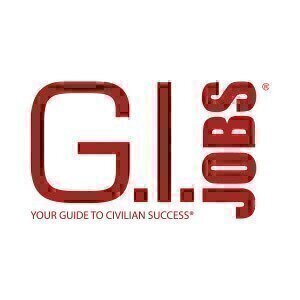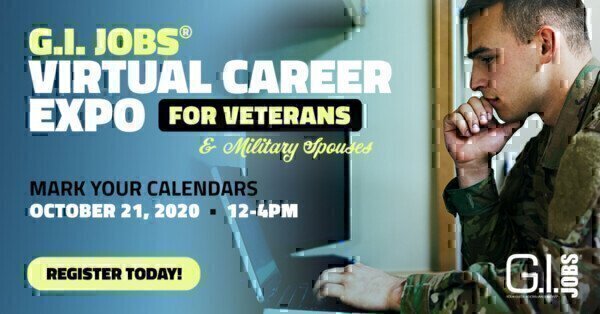As a career-driven military spouse — who has relocated to six different bases in eight years — I’ve been on my fair share of job interviews.
Having been a hiring manager, I’ve also been on the other side of the table more times than I can count.
Job interviews can be nerve wracking and might rank up there next to root canals and cleaning your toilet in terms of enjoyment. But like anything else, the anxiety leading up to it can be the worst part! However, some research and thought on the front-end can ensure you walk in prepared and ready to knock their socks off.
After reading this article, be sure to register for the upcoming G.I. Jobs Virtual Career Expo, where you can chat one-on-one with recruiters looking to hire veterans and military spouses. Registration is free, but seats are limited, so be sure to reserve your spot at the link below today!
Be prepared to answer the following “military-ish” questions…
A military spouse résumé typically looks different than the norm. An astute hiring manager may quickly notice 1) your geographical location changed frequently, and apparently randomly, 2) diversity in job type or industry and 3) there are sometimes time gaps between jobs. I typically recommend that you be prepared to answer the following questions in a succinct and confident manner:
Why did you move so much?
This is the inevitable question we all dread, and connects back to the age old milspouse question of “to tell or not to tell” that your spouse is in the military. That is your personal decision, but regardless of what you decide, you need to have a clear answer and stick to it.
I have been upfront about my husband being in the military in every job interview, but always immediately proactively highlight why hiring a military spouse is to their advantage — military spouses are adaptable, resilient, independent and wonderful at juggling multiple priorities. If you do share that your spouse is in the military, do not be apologetic about it. Be proud, as they should be proud to support our military by hiring YOU! Also remember that many civilian jobs require frequent relocation too, so while it sometimes feel like we are major outliers, we aren’t that different from those spouses in this regard. Also, if you do share your military truth, be prepared to answer the next question.
How long will you be here?
Again, how you answer this question is up to you, but be clear, concise and stick to your answer in the interview and once you’re hired. Like most of us, you may not know the answer. Don’t feel like you must overshare, volunteer extra information about the military or educate them on how the detailing process works. You don’t want to talk yourself out of the job. They don’t need to know that the military could change your orders tomorrow if they really wanted to.
In the past, I have shared that “we currently have three-year orders, but there might also be the opportunity to extend.” I also usually try and switch the conversation away from that three-year time period to focus on my willingness and desire to transfer with the company when that day comes, either in another office location or in a remote capacity. That ensures that they understand that I am looking for an organization where I can continue to grow and advance my career despite the mobile nature of my husband’s career.
Other interview tips
Once you’ve gotten past the military elephant in the room, consider these general interview recommendations:
Watch your body language.
People usually obsess over what they’re going to wear to an interview but then overlook their body language. Make sure your body language exudes confidence, from when you walk in the door, shake their hand and sit at the table. Also, note what you do with your hands when you’re talking. Do a mock interview with a friend or spouse and have them pay special attention to your hands.
For years, I didn’t notice how much I played with my hair when I was nervous. You’d think I was in a shampoo commercial the number of times I touched it and flipped it in a conversation. However, after this was brought to my attention in a mock interview, I started always wearing my hair back in a ponytail during presentations and interviews. I look better with my hair down with a fresh blowout, but if a ponytail means I am setting myself up for more success with my body language, I’ll do it.
Demonstrate you did research — but don’t be a creep!
Be prepared with questions to ask at the close of the interview that demonstrate your understanding of the organization, its products and the industry. However, do not ask questions that demonstrate that you researched the actual person interviewing you — even if you did. I recently interviewed a candidate that was qualified for the role but made comments and asked questions that so obviously demonstrated he had researched me that I felt like I needed to go close the shades to my office! In a nutshell: Researching the company = good. Researching the interviewer = creepy.
Avoid words like “fault” or “blame.”
I am sure most hiring managers could fill a small dictionary with words that make them cringe during interviews. Personally, my biggest pet peeve is when individuals use words like “fault” or “blame,” which give the impression that they lack personal responsibility. Hiring managers don’t want finger pointers on their team, but rather people that work through challenges and find creative solutions to them. This also goes hand in hand with the next recommendation which is …
Don’t talk bad about your boss or prior coworkers.
Nobody wants drama on their team. Even if you left your old job because your boss was a total jerk, that’s not a good thing to share in your interview. Find a kind and respectful way to share that you and your peers had creative differences, or you were looking for a more collaborative or positive work culture, but again, don’t point fingers. Consider the old saying, “Every time you point a finger at someone, remember that three are point back at you!”
Ask for contact information to send thank you email.
Written thank you notes may be old-fashioned, but politeness never goes out of style. While I don’t snail-mail a thank you anymore, I do send a thank you email to any person who interviews me 12–16 hours post-conversation. As the interviewer, I also appreciate receiving a thank you email as it demonstrates attention to detail and gives me a glimpse into how they will interact with our customers. However, in order to do so, you must remember to ask them for their business card or contact information at the close of the interview.
Be sure to take these skills with you to the upcoming G.I. Jobs Virtual Career Expo, where you can chat one-on-one with recruiters looking to hire veterans and military spouses. Registration is free, but seats are limited, so be sure to reserve your spot at the link below today!
This article originally appeared on Military Spouse. Follow @MilSpouseMag on Twitter.
This article has been modified to meet updated editorial standards at G.I. Jobs, which may include the augmentation of material that reflects the expertise and experiences of our staff.
READ NEXT
5 Things You MUST Do Before Attending a Job Fair
4 Tips to Find a Career After Retiring From the Military
10 Lessons I Wish I Learned Before My Military Transition





